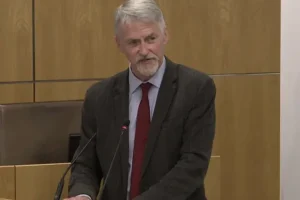FINANCIAL pressures on schools and wider public services are exacerbating pupil behaviour problems, with “wholly inadequate” health support, trade unions warned.
Claire Armitstead, director of the Association of School and College Leaders (ASCL) Cymru, warned behaviour has significantly changed post-pandemic.
She told Senedd Members: “We see challenging behaviour happening for young children… we see behaviour becoming more aggressive… more aggressive than we’ve ever seen.”
Ms Armitstead warned worsening school behaviour increases teachers’ workloads, stress and anxiety, “creating the conditions where people no longer want to stay in the profession”.
Appearing before the Senedd education committee on June 18, she raised concerns about financial pressures forcing schools to cut emotional and mental health support.

“School funding means we’re at a point where we’re nearly at just statutory provision,” she said. “Those people who helped those children change the way they behaved and gave them a life chance they probably would never have without them, they won’t be in schools.”
Laura Doel, national secretary at the National Association of Head Teachers Cymru, added that worsening behaviour shows the impact of the “desperate” situation facing schools.
She told the committee: “They cut the pastoral staff because they’re non-statutory, we have challenges in additional learning needs where we have learners in mainstream.
“For some children, it just isn’t suitable for them – we can’t cater for their needs… there’s nowhere else for them to go, so the pressure is on schools to retain them.”

Ms Doel described the number of educational psychologists in Wales and the waiting list for child and adolescent mental health services (Camhs) as “wholly inadequate”.
She said: “Social services are incredibly stretched with more pressure being put on schools to then step into that space. We can’t continue to do that.
“That will, undoubtedly, have an impact on retention of teachers because they are being asked more and more of the things that they didn’t go into the profession for.”
Ms Doel warned: “At the moment, we’re not seeing any significant move from this government to challenge those behavioural issues that we’ve got.”
She welcomed a summit on behaviour organised by ministers “but what we really need is those people on the ground to be able to build those relationships with learners”.
Ms Armitstead added: “A child with a plan for suicide and very unwell: 28 days for intervention by Camhs. The mental health of our cohorts has significantly worsened [but] the times for them to get the help they need has significantly increased.”
She stressed: “Behaviour is a symptom, not a cause. We haven’t got the multi-agency working to address the cause… health has pulled back so much for education – they are not playing their role in this community where we work together.”
Ms Armitstead, a headteacher for 15 years, said Wales needs multi-agency working or schools need to be funded to deliver those services.
Neil Foley, vice-president of the ASCL and headteacher of Prestatyn High School, warned the expectation is enormous with schools stepping in to fill the gap.

He told the committee: “The link between home and school has been severed, so when a child misbehaves, they have their phone out in class or they’re caught with a vape – we are met with challenge from home as well.”
Mr Foley added: “We can do everything we can but if we don’t get support from home, behaviour initiatives and everything that we’ve put in place – the longevity is not there because the parents are not supportive.”
Giving evidence to the committee’s inquiry on teacher recruitment and retention, the witnesses warned of “toxic” workloads and “mission creep”, raising the example of headteachers acting as caretakers due to a lack of funding to recruit.
Ms Armitstead told the committee: “The reality is – because the workload is so enormous – if you don’t love it, you can’t do it.”
The former headteacher warned of an “almost exponential” increase in abuse faced by school staff on social media, with “hatred breeding hatred”.
“Pre-pandemic, teachers and school leaders were seen as having positive intent, whether we agreed or not – our intent was never questioned,” she said.
“But now our intent is questioned – and publicly.”














